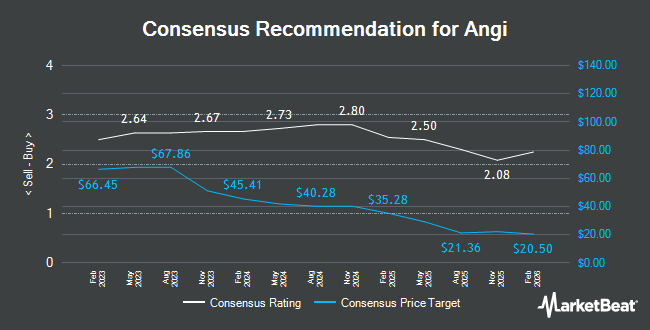Angi (NASDAQ:ANGI - Get Free Report) was upgraded by Wall Street Zen from a "hold" rating to a "buy" rating in a research note issued to investors on Saturday.
A number of other research firms also recently commented on ANGI. Zacks Research downgraded shares of Angi from a "strong-buy" rating to a "hold" rating in a research report on Monday, September 8th. UBS Group raised their target price on shares of Angi from $20.00 to $22.00 and gave the company a "neutral" rating in a research report on Thursday, August 7th. Weiss Ratings downgraded shares of Angi from a "hold (c-)" rating to a "sell (d+)" rating in a research report on Wednesday. Citigroup downgraded shares of Angi from a "buy" rating to a "market perform" rating in a research report on Monday, June 16th. Finally, JMP Securities restated a "market perform" rating on shares of Angi in a report on Monday, June 16th. Two research analysts have rated the stock with a Buy rating, eight have issued a Hold rating and one has issued a Sell rating to the company. According to data from MarketBeat.com, the company has a consensus rating of "Hold" and a consensus price target of $22.07.
Read Our Latest Stock Report on ANGI
Angi Trading Down 5.4%
NASDAQ ANGI opened at $13.36 on Friday. The company has a debt-to-equity ratio of 0.50, a quick ratio of 1.79 and a current ratio of 1.79. The company has a market capitalization of $592.38 million, a price-to-earnings ratio of 10.86 and a beta of 1.75. The company's 50-day simple moving average is $17.17 and its two-hundred day simple moving average is $15.72. Angi has a one year low of $10.88 and a one year high of $27.10.
Angi (NASDAQ:ANGI - Get Free Report) last posted its earnings results on Tuesday, August 5th. The technology company reported $0.23 EPS for the quarter, missing analysts' consensus estimates of $0.24 by ($0.01). The business had revenue of $278.22 million for the quarter, compared to analysts' expectations of $261.02 million. Angi had a net margin of 5.50% and a return on equity of 5.73%. Angi's revenue for the quarter was down 11.7% on a year-over-year basis. Equities analysts forecast that Angi will post 0.08 EPS for the current fiscal year.
Institutional Trading of Angi
An institutional investor recently bought a new position in Angi stock. Poehling Capital Management INC. bought a new position in Angi Inc. (NASDAQ:ANGI - Free Report) in the second quarter, according to its most recent filing with the SEC. The firm bought 15,146 shares of the technology company's stock, valued at approximately $231,000. 12.84% of the stock is owned by institutional investors.
Angi Company Profile
(
Get Free Report)
Angi Inc connects home service professionals with consumers in the United States and internationally. The company operates through three segments: Ads and Leads, Services, and International. It provides consumers with tools and resources to help them find local, pre-screened and customer-rated service professionals, matches consumers with independently established home services professionals.
Read More

This instant news alert was generated by narrative science technology and financial data from MarketBeat in order to provide readers with the fastest and most accurate reporting. This story was reviewed by MarketBeat's editorial team prior to publication. Please send any questions or comments about this story to contact@marketbeat.com.
Before you consider Angi, you'll want to hear this.
MarketBeat keeps track of Wall Street's top-rated and best performing research analysts and the stocks they recommend to their clients on a daily basis. MarketBeat has identified the five stocks that top analysts are quietly whispering to their clients to buy now before the broader market catches on... and Angi wasn't on the list.
While Angi currently has a Hold rating among analysts, top-rated analysts believe these five stocks are better buys.
View The Five Stocks Here
Discover the 10 Best High-Yield Dividend Stocks for 2025 and secure reliable income in uncertain markets. Download the report now to identify top dividend payers and avoid common yield traps.
Get This Free Report
Like this article? Share it with a colleague.
Link copied to clipboard.